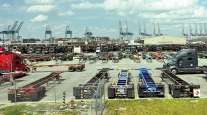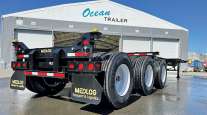Senior Reporter
Carriers Claim Victory in Chassis Choice Ruling

[Stay on top of transportation news: Get TTNews in your inbox.]
The Intermodal Motor Carriers Conference of American Trucking Associations has won a favorable judgment in its case against the Ocean Carrier Equipment Management Association and others in a dispute involving chassis choice for carriers that operate at maritime and inland ports.
Federal Maritime Commission Chief Administrative Law Judge Erin Wirth on Feb. 6 issued a partial summary judgment in favor of IMCC, which alleged in their initial 2020 filing that OCEMA and 11 international ocean carriers violated the Shipping Act of 1984 by inflating prices for intermodal chassis at dozens of ports nationwide.
At most major ports, ocean shipping companies have historically controlled the chassis-leasing business under the Uniform Intermodal Interchange and Facilities Access Agreement, which is administered by a 10-member group of industry representatives. At these ports, trucking companies are directed toward chassis available for rent and the rates being charged.

Eisen
At the center of the dispute are agreements shippers make with intermodal equipment providers at ports — agreements into which IMCC-maintained motor carriers historically have had no say, even though they are bound to use those providers’ equipment. This, IMCC charged, put carriers at a disadvantage. The two sides negotiated for months in search of a compromise, with the lack of availability of chassis, the overall quality of the equipment and its pricing all at the center of talks.
In her ruling, Wirth said, “Where an exclusive [intermodal equipment provider] arrangement has been contractually created by the ocean carrier, and where this prevents a motor carrier from using a chassis at a lower rate from an alternate chassis provider of its choice, the motor carrier is financially harmed and the market for chassis is restrained.”
Further, she said the record reflects that “limitations on a motor carrier’s ability to choose their own chassis provider for [merchant haulage] is unreasonable.”
Wirth added, “IMCC has also established as a matter of law based on the undisputed material facts that the exclusive chassis agreements at issue violate the Shipping Act when the motor carrier is not able to utilize the chassis provider of its choice for merchant haulage transportation.”
Wirth, who sided with OCEMA on some technical issues, received more than 9,000 pieces of evidence before issuing her 62-page ruling.
“This victory has been a long time coming,” IMCC Executive Director Jonathan Eisen said. “The decision is the first step in putting a stop to the practice of foreign-owned shipping lines forcing American drivers and motor carriers to use specific equipment providers to move goods — which will help reduce supply chain delays and cut costs for carriers and consumers.”
Every day around the country, thousands of chassis are used to move cargo at some of the nation’s biggest and busiest port complexes. The ruling centered on several of them, a move the two sides agreed on to narrow the focus and reduce the amount of pretrial discovery.

Host Seth Clevenger speaks with autonomous vehicle pioneer Don Burnette about the pros and cons of driverless cars and trucks. Hear the program above and at RoadSigns.TTNews.com.
Third of a three-part series on autonomous vehicles. Hear Part I here, and Part II here.
Wirth wrote, “Within 30 days of the date this decision becomes final, Respondents shall cease and desist from violating the Shipping Act in Chicago, Los Angeles/Long Beach, Memphis and Savannah by ceasing and desisting adopting, maintaining, and/or enforcing any regulations or practices that limit the ability of a motor carrier to select the chassis provider of its choice for merchant haulage.”
The combined Los Angeles/Long Beach port complex moves an estimated 20 million 20-foot-equivalent containers annually on chassis, either to their final destination or to rail yards where they are shipped on trains. In recent years the Port of Savannah has nearly doubled its capacity, to nearly 6 million containers a year and is now the second-busiest port on the East Coast. Chicago and Memphis are major freight rail centers.
“The ocean carrier’s practices of prohibiting motor carriers from using the provider of their choice when they are paying for the chassis has held U.S. motor carriers hostage and forced them to subsidize the shipping lines,” Eisen said. “We are pleased the judge agreed and we look forward to ending these unreasonable and unjust practices permanently.”
Wirth did not grant any financial award in her decision, in which she wrote, “There is not sufficient evidence in the record to award reparations at this stage of the proceeding.”
For years, ocean carriers owned and leased chassis and other intermodal equipment to trucking companies that truck drivers use to move containers from ports to inland locations. About 10 years ago, ocean carriers began working with third-party leasing companies to reduce their cost of managing and owning containers.

Manning
Trucking companies have long complained about the quality of chassis at ports, especially related to tires, brakes and lighting. Some chassis distributors have upgraded their equipment by replacing older chassis or refurbishing them and adding radial tires, disc brakes and LED lighting.
Former ATA Chairman and current North American Chassis Pool Cooperative Chair Dave Manning told Transport Topics the judge’s ruling is a “significant win for trucking companies that use chassis and support chassis choice.”
However, he believes OCEMA will likely appeal the ruling to the full, five-member Federal Maritime Commission for a hearing.
IMCC Chair Mark George remains open to the two sides arriving at some resolution.
“My hope is that we can take this to the ocean carriers, and maybe we can ask them to meet with the motor carriers, and sit with them in a meaningful way, to come up with a plan that works for the beneficial cargo owners,” he said. “Motor carriers and the trucking industry are major stakeholders in delivering many of the containers that are delivered in this country. We need to work together to deliver a better project to our customers and choice will do that, make more chassis, more abundant.”
Want more news? Listen to today's daily briefing below or go here for more info:




